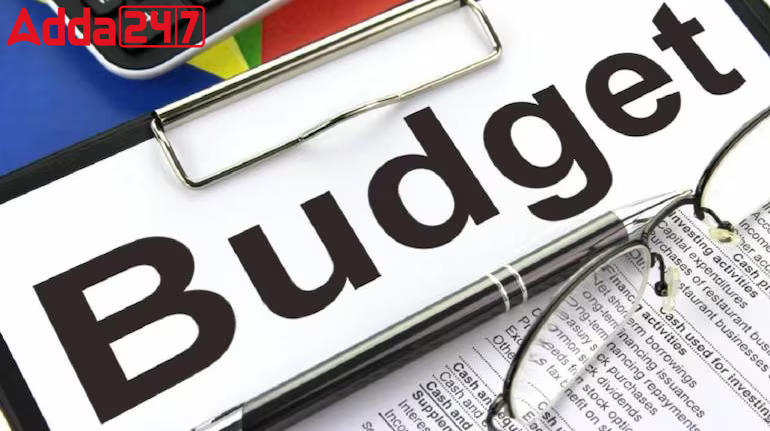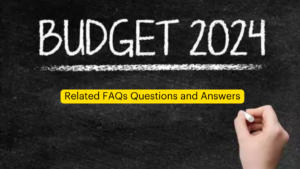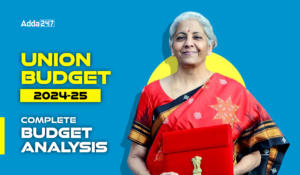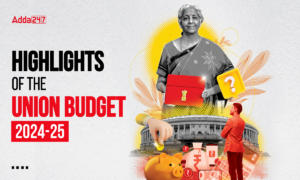What exactly is a budget?
A budget is a comprehensive report presented by the government, consolidating revenues and outlays. It serves as the annual financial statement of a government, detailing its revenue and expenditure.
Budget in the Indian Constitution
The term ‘Budget’ is not explicitly mentioned in the Indian Constitution; instead, the corresponding term used is ‘Annual Financial Statement’ (Article 112).
Constitutional Requirements Making Budget Necessary
-
Article 265: No tax shall be levied or collected except by the authority of law, requiring parliamentary approval for taxation.
- Article 266: No expenditure can be incurred except with the authorization of the Legislature, necessitating parliamentary approval for expenditures.
-
Article 112: The President shall, in respect of every financial year, cause to be laid before Parliament the Annual Financial Statement.
FRBM Act
The Fiscal Responsibility and Budget Management (FRBM) Act, enacted in 2003, aims at better budget management. It mandates certain documents to be presented in Parliament annually, alongside the Budget, regarding the country’s fiscal policy.
Budget Documents
The Budget documents include:
- Annual Financial Statement (AFS): Article 112
- Demands for Grants (DG): Article 113
- Appropriation Bill: Article 114(3)
- Finance Bill: Article 110(a)
- Memorandum Explaining the Provisions in the Finance Bill.
- Macro-economic framework for the relevant financial year – FRBM Act
- Fiscal Policy Strategy Statement for the financial year – FRBM Act
- Medium Term Fiscal Policy Statement – FRBM Act
- Medium Term Expenditure Framework Statement – FRBM Act
- Expenditure Budget Volume-1
- Expenditure Budget Volume-2
- Receipts Budget
- Budget at a glance
- Highlights of Budget
- Status of Implementation of Announcements made in Finance Minister’s Budget Speech of the previous financial year.
Documents at Serial 1-4 are mandated by the Constitution, and those at Serial 6-9 are as per the provisions of the FRBM Act. Other documents support the mandated ones with explanatory content.
Government Budgeting: Railway Budget Presentation
Until 2016, the Indian Railways budget was presented separately but merged with the Union Budget since 2017. Figures related to Railways are included in the Annual Financial Statement.
Government Budgeting: Union Budget Presentation
The Budget is presented to Parliament on a date fixed by the President. Since 2017, it is presented on February 1, preceded by the Economic Survey on January 31. In an election year, the Budget may be presented twice — first for a Vote on Account and later in full.
Vote on Account
If the Parliament cannot vote on the entire budget before the new financial year, a Vote on Account is used, providing funds for government operations for a part of the year, usually two months.
Budget Speech
The Finance Minister’s Budget Speech is in two parts: Part A deals with the general economic survey, while Part B relates to taxation proposals. The Annual Financial Statement is presented at the conclusion of the speech in the Lok Sabha.
Important Takeaways For All Competitive Exams
- Budget Basis: The Indian government’s annual financial statement, termed the budget, is rooted in constitutional requirements outlined in Article 112.
- Constitutional Mandates: Taxation (Article 265) and expenditures (Article 266) demand parliamentary approval, ensuring fiscal accountability.
- FRBM Act: Enacted in 2003, the Fiscal Responsibility and Budget Management Act enhances budgetary control and mandates key documents for parliamentary presentation.
- Key Budget Documents: Include Annual Financial Statement, Demands for Grants, Appropriation Bill, Finance Bill, and various statements mandated by the FRBM Act.
- Railway Budget Integration: Since 2017, the Indian Railways budget is part of the Union Budget, presented on February 1 annually.
- Vote on Account: Used when the full budget cannot be approved before the new financial year, ensuring government operations for a limited period.
- Budget Speech: Finance Minister’s speech has two parts—general economic survey and taxation proposals. The Annual Financial Statement is laid before Parliament at the conclusion.
- Economic Survey: Presented a day before the budget, providing a comprehensive overview of the country’s economic status.
- Parliamentary Process: Budget discussions follow presentation, crucial for effective governance and financial planning.
- Constitutional Alignment: The budget process aligns with constitutional provisions, upholding transparency and accountability in financial matters.
Important Questions Related to Exams
What is the constitutional basis for the Indian budget process?
a. Article 110
b. Article 112
c. Article 266
d. Article 120
Which Act was enacted in 2003 to enhance budget management in India?
a. Goods and Services Tax (GST) Act
b. Income Tax Act
c. Fiscal Responsibility and Budget Management (FRBM) Act
d. Banking Regulation Act
Which document is presented alongside the Annual Financial Statement as per the FRBM Act?
a. Demands for Grants
b. Expenditure Budget Volume-1
c. Finance Bill
d. Economic Survey
When was the last separate Railway Budget presented before its integration with the Union Budget?
a. 2016
b. 2017
c. 2018
d. 2015
In an election year, how many times may the budget be presented?
a. Once
b. Twice
c. Thrice
d. No limit
Which article of the Indian Constitution ensures parliamentary approval for taxation?
a. Article 110
b. Article 112
c. Article 265
d. Article 114
What is the primary focus of Part B in the Finance Minister’s Budget Speech?
a. Economic Survey
b. Taxation Proposals
c. Fiscal Policy Strategy
d. Expenditure Budget
Which year marked the integration of the Railway Budget with the Union Budget?
a. 2015
b. 2016
c. 2017
d. 2018
What does a Vote on Account primarily deal with in the budget process?
a. Taxation
b. Expenditure
c. Fiscal Policy
d. Economic Survey
What is the key purpose of the Economic Survey presented before the budget?
a. Historical Financial Data
b. Overview of Economic Status
c. Taxation Proposals
d. Fiscal Responsibility Assessment
Kindly share your responses in the comment section!!



 Union Budgets 2024-25 Related FAQs Quest...
Union Budgets 2024-25 Related FAQs Quest...
 Union Budget 2024-25: Complete Budget An...
Union Budget 2024-25: Complete Budget An...
 Key Highlights of the Union Budget 2024-...
Key Highlights of the Union Budget 2024-...
